Z List of Movie Reviews
(For optimum viewing, adjust the zoom level of your browser to 125%.)
Z (1969)
Rate:
7
Viewed:
9/15
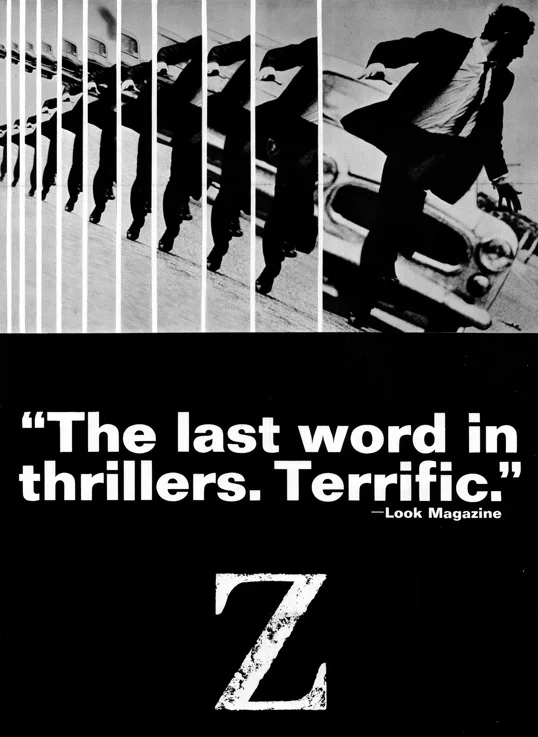
9/15:
Z was confusing to follow for the first hour or so because I kept focusing on the political platform.
Then, I realized it's not about that but rather how a government cover-up worked and how an investigation was carried out to
unearth it. Eventually, by shifting to this perspective, the movie became better. The aftermath was satisfying because it's
what I would expect.
Besides the murky foreign politics, the reason for the low rating is the editing which is annoying to put up with. Also, some
parts of what happened, especially the political leader walking in the open, are too simplistic.
Really, what it's about is fact-checking. Sure, the movie is boring, but it gives me a feel of how an investigation should
be conducted. Hence, there's authenticity. This aspect will either make or break a potential viewer's enjoyment.
All in all, Z merits another try in the future to see if I'll appreciate it more.
Z.P.G. (1972)
Rate:
6
Viewed:
12/20
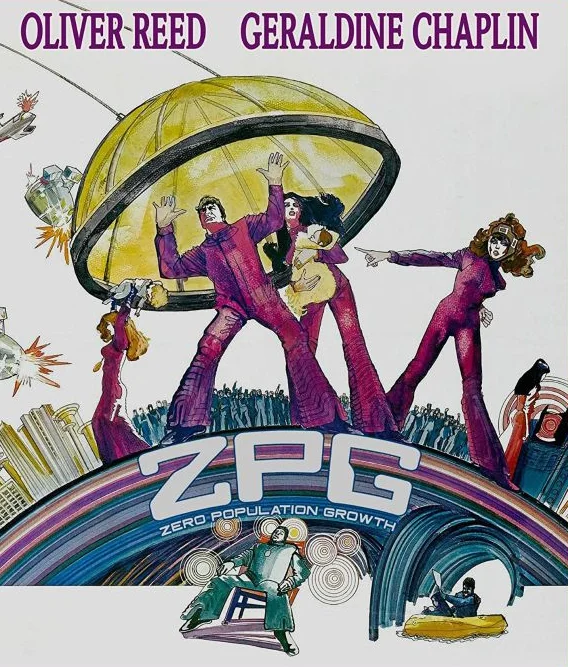
12/20:
The letters for the title Z.P.G. ominously stand for Zero...Population...Growth.
In the tradition of Soylent Green and
Logan's Run, Z.P.G. presents a dystopian view of how
to get a smoggy, overpopulated planet under control in the future. This time, the solution is outlawing
pregnancies for the next thirty years; otherwise, it's death for the couple.
Does it sound far-fetched? Maybe not, but I can see the U.S. government doing this, having already dictated
people's actions and censored their freedom of speech. Yet I'm not sure about the masks worn by the characters.
There's no filter anywhere on them as they're still breathing the same poisoned air. This is doubly true while
indoors.
What bothers me a lot about the ending is Russ and Carol choosing to run away to a zoned land that's full of
radiation. Won't it be self-defeating by allowing themselves, including the baby, to be prone to cancer in no time?
Then again, if there are no plants and animals, how is Earth inhabitable for human beings? What are they eating
after all? And it's made from exactly what?
Oliver Reed tends to dominate pictures, but here, he's largely ineffective. Instead, it's about the plot which
is based on Paul Ehrlich's sensationalistic book The Population Bomb. Although the sci-fi concepts are
interesting, the movie is slow-paced that's almost lifeless and devoid of emotions. After the novelty wears off,
there's no meat left; hence, it runs on fumes for a while, giving me a hard time to reach the end.
Geraldine Chaplin, who's Charlie's daughter, has dots under both of her eyes. I thought at first she had a mascara
problem, but they were real after all; hence, they're called beauty marks. Her performance isn't great anyway:
just flat, causing the film to be slow.
All in all, by filling in more substance to cover up the plot holes while providing new concepts, Z.P.G.
can come closer to being in the same league with Soylent Green and
Logan's Run as great dystopian sci-fi pictures.
Zabriskie Point (1970)
Rate:
1
Viewed:
6/13
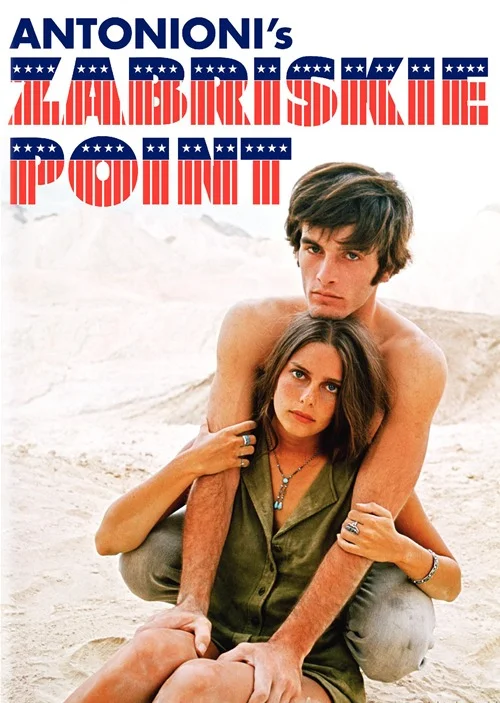
6/13:
Why is it that a failed film generates renewed interest years later and subsequently gains cult film status?
Is this movement per se becoming cliché? Anyway, I read in a book that Zabriskie Point was named one
of the fifty worst films made. Unnaturally enough, I became interested in seeing it.
It opens with a scene of fake thespians pretending to be revolutionaries by trying to look cool in the process (why
am I now thinking of Billy Jack?) and saying silly phrases
such as "power to the people" and "they're kicking down the door."
Soon thereafter, a couple of them decide to get guns, so they can protect themselves from uh...pigs? Some time
passes, and the boy with bad teeth decides to hijack a plane in order to recreate the well-known scene in
North by Northwest. It's how the girl driving
the car will meet him at some point later.
Finally, I'm at the moment of where the title of the film comes from when this "it's beautiful" girl runs after
the "it's dead" boy and they both frolic in the middle of the desert that's called...*drum roll* Zabriskie Point.
They're doing it while being covered in (you have to see this to believe it) sand, gypsum, boracite, and whatnot.
Minutes later, all of a sudden, many couples appear out of nowhere doing the same thing in a choreographed orgy.
They're licking sand, gypsum, boracite, and whatnot from each other.
When the brain-dead girl and the boy with hideous teeth come out of the desert to return to the car, they both look
sparkling clean as if they've just had a shower. All of a sudden, the plane is magically painted with corny words
that are supposed to be emblems of the 60's counterculture movement. I'm only surprised both of them did all of
the activities in one day.
One hour into Zabriskie Point, I thought there were enough elements to withstand the Worst Film label. But
no...as the boy with crap teeth decides to get back to Los Angeles with the hijacked plane, this is when the movie
began to shoot itself in the foot. The rest of the way is a long dragged-out sequence of ridiculousness and
pointlessness with the last ten minutes of stuff being repeatedly blown up in a slow-motion from different angles
before closing out with a sunset.
I had been wondering the whole time: was Michelangelo Antonioni mentally retarded? Also, did he watch
2001: A Space Odyssey
and Easy Rider too many times and then want to emulate
them? By the way, the following is seemingly a
Ripley's Believe It or Not! trivia. The boy with ugly teeth is named Mark Frechette. Zabriskie Point
was his debut film, and he had no prior thespic experience. Afterwards, he did some acting work and then
decided to rob a bank with his friends, landing himself in the slammer. One day, he was lifting weights, and the
bar weighing 150 pounds fell atop his throat, killing him at the age of 27.
All in all, any time a film reaches below Zabriskie Point, that's when it will begin to suck.
Zodiac (2007)
Rate:
5
Viewed:
9/25
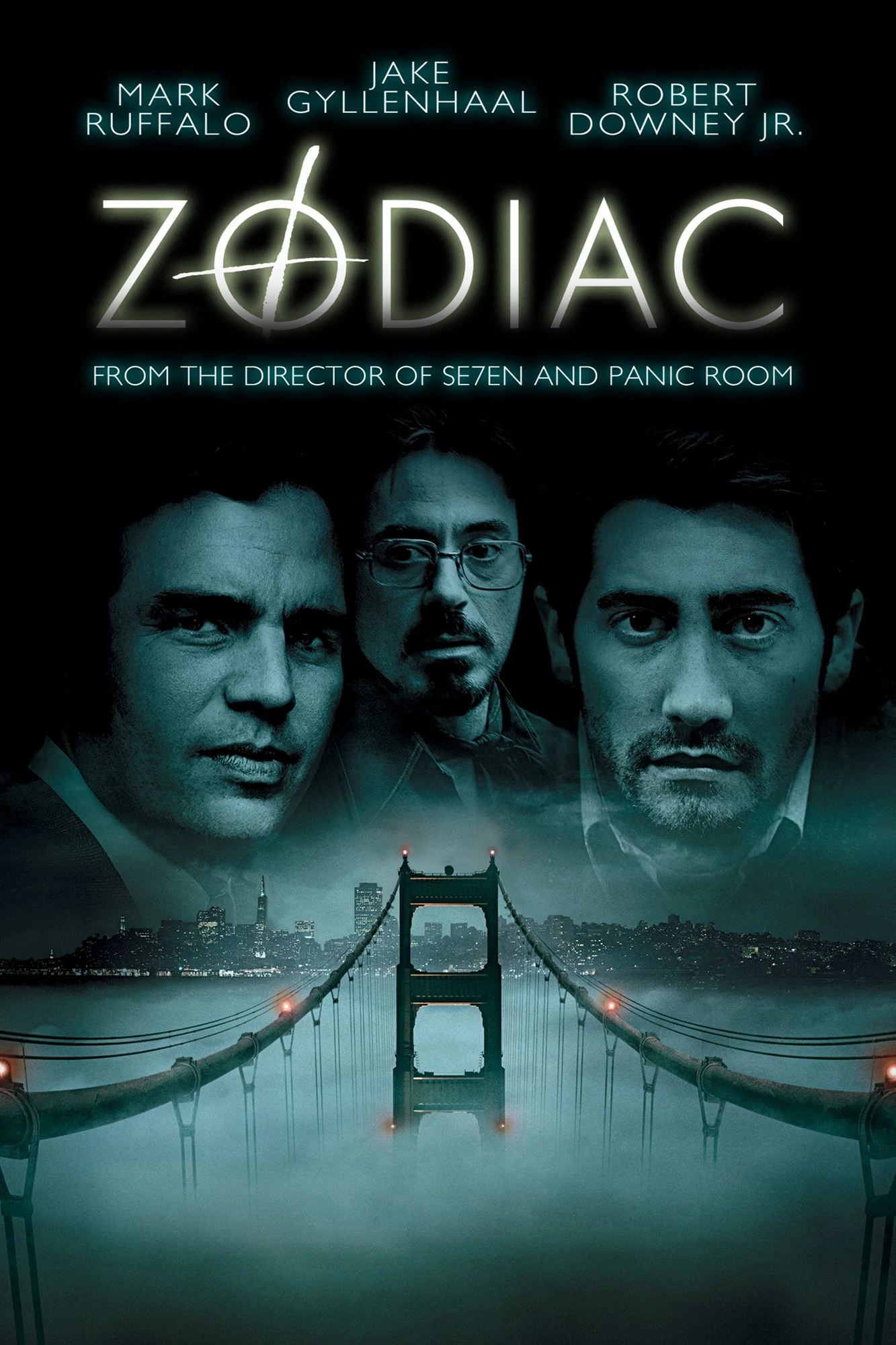
9/25:
The biggest issue when it comes to the Zodiac case is credibility.
Robert Graysmith is the author of a book that's frequently referred to as the main source: Zodiac, but
he's a former cartoonist with no writing or law enforcement experience in any capacity. It was
published in 1986. Given that the case pretty much died down by 1972 and the fourth and final murder
happened in 1969, what took him so long? Then again, why Robert Graysmith? What about Paul Avery? Here's
the shocker: they both never met each other while working at the San Francisco Chronicle and had no
relationship afterwards. In the film Zodiac, Robert Downey, Jr., doesn't even look like Paul Avery.
Worse, how do we know all of the five murders in four attacks were attributed to a single serial killer?
If we take away the letters and the ciphers, there's actually nothing in common among the four attacks including
forensic evidence. The Lake Berryessa attack is unique as it's probably the work of a copycat killer
since nobody ever did anything like that before or since then. One can guess he learned enough from the newspaper
articles.
Now, I'm curious: what was the chain of custody in regard to the letters and the ciphers? That's an important
point because the following needs to be asked: could it be that they were made up by the
San Francisco Chronicle, most specifically Robert Graysmith? How do we know they weren't? If the envelope
could be externally identifiable based on the handwriting and the way the writing was structured, did the post
office give that straightaway to the police? If not, then the whole thing is suspect. Also, the decision to
publish the letters and the ciphers in the newspaper has to be questioned.
Interestingly, the letters and the ciphers started coming in AFTER Robert Graysmith was hired.
Coincidence or...not? Except for the very first correspondence on July 31, 1969, only one letter was sent to
the San Franscisco Examiner and the Los Angeles Times with the rest going to the
San Francisco Chronicle. By the way, what was the credibility level of the
San Francisco Chronicle before the Zodiac case started? If you want to know, it used to be a
tabloid paper for the longest time although with star investigative reporters who ultimately left in the
early 70's. For example, it made up a story about the invasion of biker gangs in Hollister, California,
in 1947 that became the basis of a film starring Marlon Brando: The Wild One.
When the writer sent the letters and the ciphers, he didn't reveal anything incriminating beyond what could be
learned from the newspapers and/or from police reports (keep in mind that the San Francisco Chronicle had
almost virtual access to them at the time). If you compare Robert Graysmith's books to the
police reports, which are freely available online, a great deal of additional content has been made up. Yet he
wrote so much, matching what's true that's still not known to the public [the documents were officially released
decades later]. Moreover, he plagiarized some newspaper articles to take the place of his own interviews with
the people involved. His style is often akin to the purple prose championed by Truman Capote in
In Cold Blood, forcing skeptics to ask themselves, "How did the author
know? Was he there personally?" when it comes to moments that can only be known to the killer(s) and the deceased.
Arthur Leigh Allen did it? Okay, where's the damning evidence? The San Francisco Police Department (SFPD)
did everything possible to pin the murders on him, but nothing stuck. The whole Zodiac thing has to be
impossible to get away with if he did it. In other words,
Arthur Leigh Allen didn't do it which means he's being framed by Robert Graysmith. I'm only surprised no
lawsuit was filed against him for libel. It's irresponsible of the filmmakers to do that for Zodiac.
Anyway, as a stand-alone, the movie is all right for what it is. The performances hold up, and I like
Mark Ruffalo's the most. As Robert Graysmith, Jake Gyllenhaal is annoying and shouldn't be a participant
in the case at any minute. When a certain phrase was mentioned in the first cipher, I was like, "Yeah, that's
The Most Dangerous Game...duh," but nobody made the connection
for a while.
For the most part, the film doesn't do well in depicting the late 60's and the early 70's. To see what I mean is
to check out Bullitt and Dirty Harry.
Going back to Truman Capote, how did the filmmakers know what exactly happened in these four attacks? But that's
not how true crime works; investigators only see the aftermath and interrogate people including witnesses and
survivors.
One nice piece of trivia is that former SFPD Inspector Dave Toschi was the inspiration behind the famous
characters in the two aforementioned films. Oh, yeah...his removal from the Zodiac case and then demotion in
1978? That's because he, two years prior, "acknowledged writing and mailing anonymous fan letters to the
Chronicle lauding his own work." What about the news program on October 22, 1969? It turned out to be
a mental patient at an Oakland hospital making a crank call. That's when we can safely say there were copycats
due to widespread media coverage, thanks to the San Francisco Chronicle.
The cipher on November 8, 1969, remained unsolved until 2020. By the time it was decrypted, nothing important
could be gleaned. There are two more unsolved ciphers, and both will probably be full of shit, too. Robert
Graysmith never cracked the cipher as stated in the film which had been confirmed by the FBI. Of the film,
director David Fincher later admitted, "I don't know whether or not this really happened," and "I know
this didn't happen this way, but we thought it worked better." Gee, thanks...why not just change the title
and the names of every character and declare the film a work of pure fiction?
All in all, Zodiac is factually bullshit and too long.
Zombie (1979)
Rate:
3
Viewed:
12/07
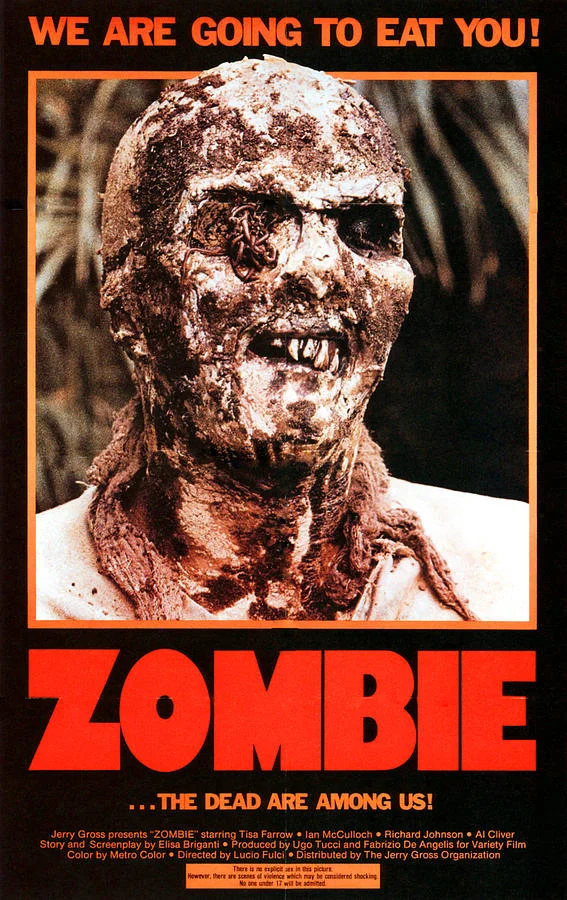
12/07:
Lucio Fulci's Zombie is a straight up rip-off of
Night of the Living Dead.
His idea is the fleshier the eating scenes are, the better the film is...not. The plot is simple yet scanty which
renders Zombie pointless. Ultimately, the bottom line is: it's all about the flesh eating.
When Lucio Fulci applies a distinctive style which is nothing new, it comes off as heavy-handed. That's why this
one fails to be any different from the king of all zombie movies:
Night of the Living Dead. Worst of all, it's
slow. The acting is often theatrical in a soap operatic manner.
At least, there's a particular scene that needs to be seen to believe. It's when a zombie went after the naked
female scuba diver and then had a battle with the great (miniature?) white shark. Since when did zombies dwell
underwater? On the positive side, I like the makeup work, and it looks realistic which may be the only aspect
that's superior to the other film.
All in all, Zombie has made a zombie out of me, and I don't mean that in a good way.
Zorro, The Gay Blade (1981)
Rate:
9
Viewed:
4/04, 12/06, 3/12
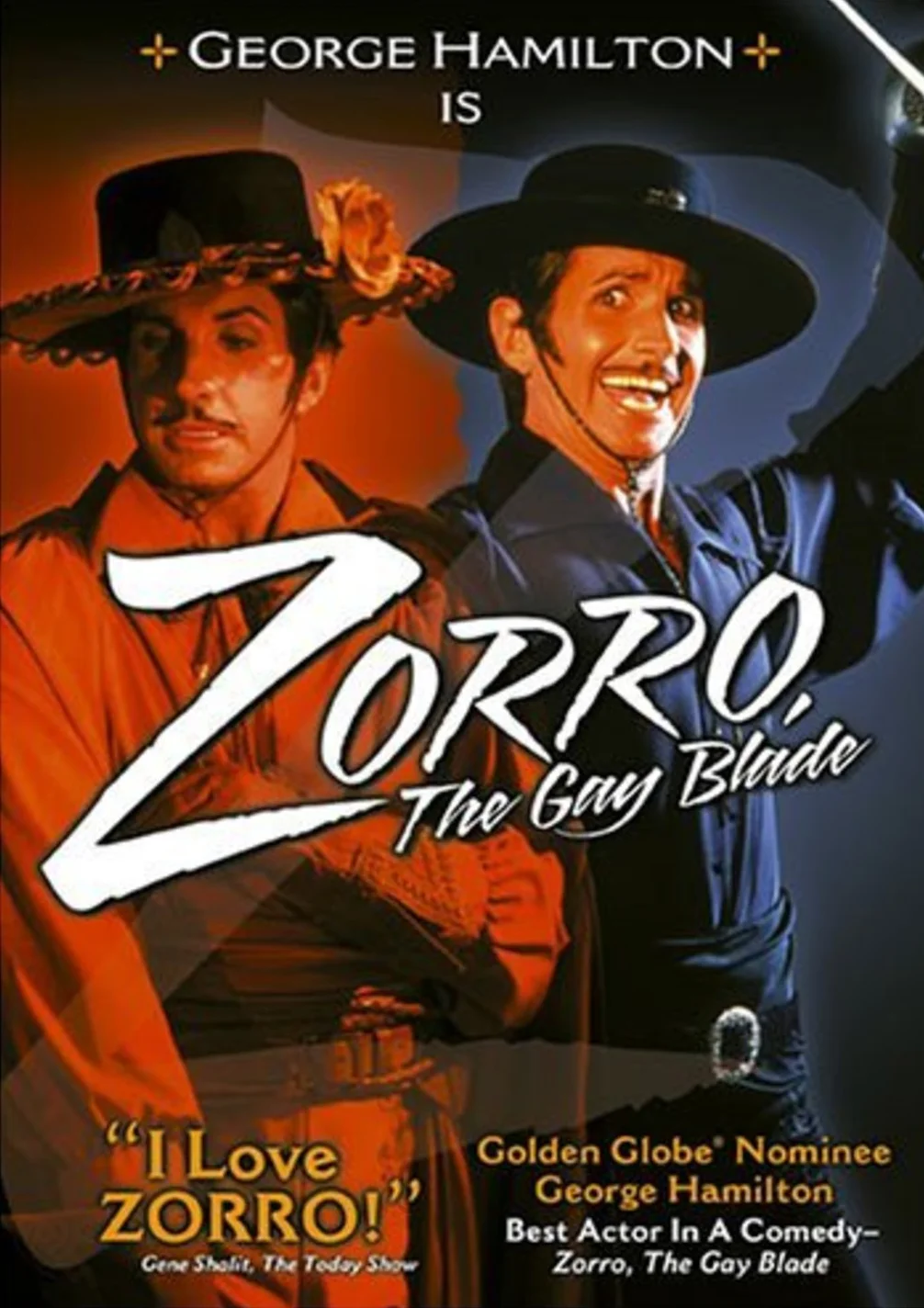
12/06:
Zorro, The Gay Blade is a refreshing breath of air after watching
The Mask of Zorro and
The Legend of Zorro.
It's one of the funniest films I've seen in my life and is quite high on the scale of creativity. I've forgotten how good it
feels to watch George Hamilton being the jack of all trades. What makes this one far away the best compared to other
Zorro films is that it stays true to the feeling of what the character represents and then wanders to the insane side
of hilarity.
I've mentioned many times villains can play a large part in making a film likable only if they're as appealing as the
hero. Well, there's no question Ron Leibman stole the show as the hated Alcalde. What a fantastic performance. He should've
gotten an Oscar for it.
All in all, Zorro, The Gay Blade has my highest recommendation because it's so funny.
3/12:
Although George Hamilton is sensational for playing the dual role of Zorro and his gay brother, it's Ron Leibman who completely
steals the show.
Alcalde reaches the zenith of his insanity when he attempts to solve the riddle out of Zorro's colorful costumes, resulting
in a salad mix. Then, he does this finger pointing to his taxmaster, making him sit down. One scene when Ron is walking
like he's ssssaaaa and ssssswwwingg yoouurrr hipssss still cracks me up.
Pretty much, Ron Leibman owns the role by giving it all. He's brilliant, and it's Oscar material for sure. George Hamilton
is outstanding, too, and perfectly cast as Zorro and his gay brother Bunny Wigglesworth. The whole film is pure farce with
a great play on words that's based on a crazy but workable idea.
All in all, Ron Leibman is easily the Oscar winner for his performance in Zorro, The Gay Blade.
Zulu (1964)
Rate:
5
Viewed:
11/02, 5/25
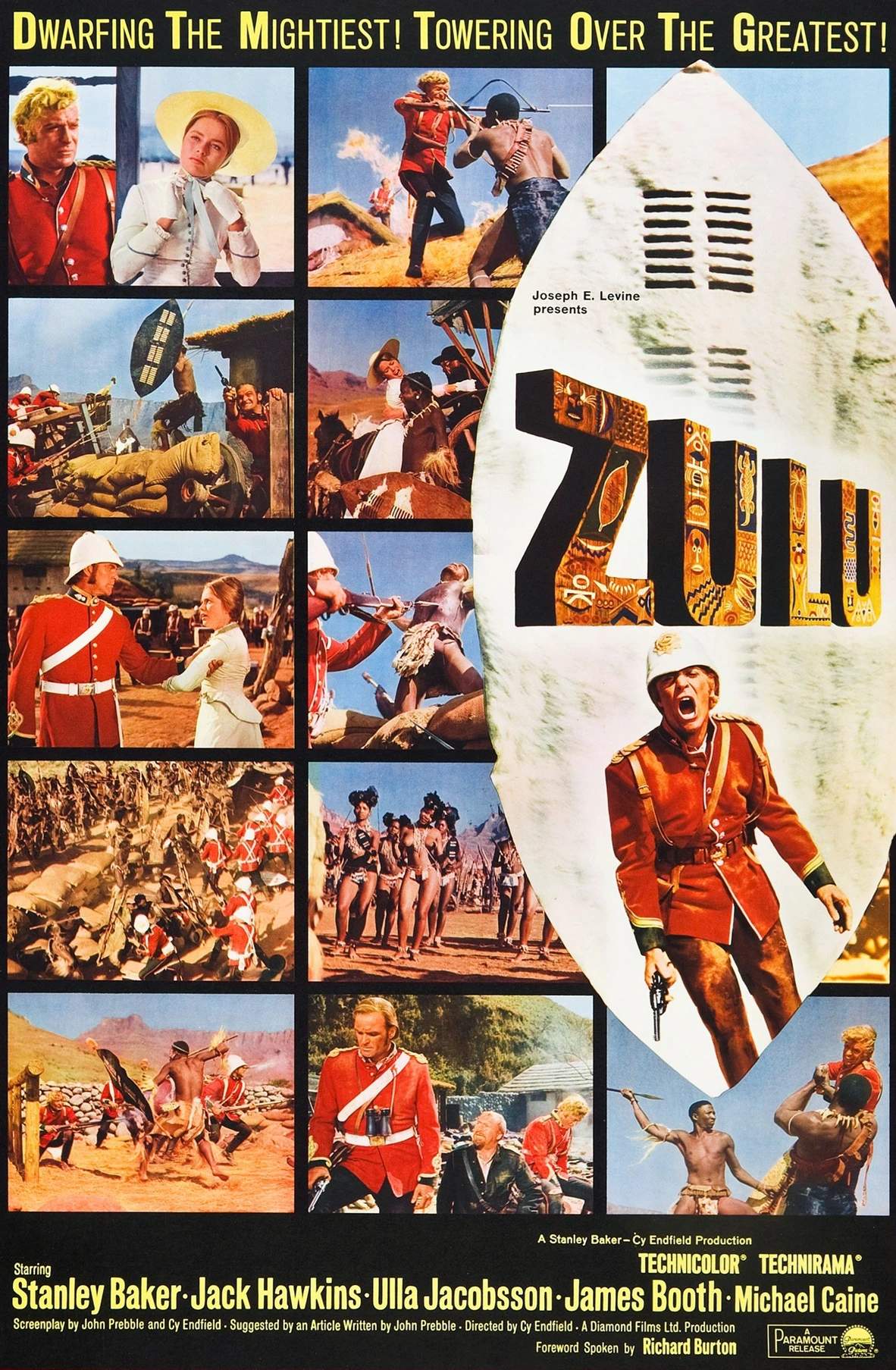
5/25:
I hate Zulu.
Calling it among the best films ever, the British should be embarrassed of what transpired. It's not an
accomplishment but is rather similar to scoring 100 points against a school of mentally retarded players in
a high school basketball game.
Although everything shown is historically accurate for the most part, the very first question that should be
asked is: what led to this battle at Rorke's Drift? The movie won't say. Things just don't happen out of the
blue. According to Wikipedia on how the Anglo-Zulu War was started:
"Following the passing of the British North America Act 1867 forming a federation in Canada, Lord Carnarvon
thought that a similar political effort, coupled with military campaigns, might lead to a ruling white minority
over a black majority in South Africa. This would yield a large pool of cheap labor for the British sugar
plantations and mines and was intended to bring the African Kingdoms, tribal areas, and Boer republics
into South Africa."
That explains everything. In other words, the British had no business being in South Africa. As for the fighting,
the Zulu warriors would have to be either stupid or clueless. Who knows what the whole thing looked
like for real? Historians say the British were heavily fortified and were thus nearly impenetrable, but the movie
shows otherwise.
All in all, Michael Caine's line "I feel ashamed" says everything in terms of British's standing in history.